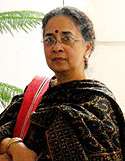Shamita Das Dasgupta
Shamita Das Dasgupta (Bengali : শমীতা দাশ দাশগুপ্ত, born 1949) is an Asian Indian scholar and activist.[1] A social activist since early 1970s, she co-founded Manavi in 1985.[2] It is the first organization of its kind that focuses on violence against South Asian women in the United States. A part-time teacher and full-time community worker, she has written extensively in the areas of ethnicity, gender, immigration, and violence against women. Her books include: A Patchwork Shawl: Chronicles of South Asian Women in America, Body Evidence: Intimate Violence Against South Asian Women in America, Globalization and Transnational Surrogacy in India: Outsourcing Life and Mothers for Sale: Women in Kolkata’s Sex Trade.[3]
Shamita Das Dasgupta | |
|---|---|
 | |
| Born | Shukla Das |
| Education | Sakhawat Memorial High School BS, MS, PhD Ohio State University |
| Occupation | teaching, social activism |
Notable work | cofounder of Manavi |
| Spouse(s) | Sujan DasGupta |
| Children | Sayantani DasGupta |
Background
Married at an early age, she moved to the US at the age of 19. She did her undergraduate and graduate studies at Ohio State University and received her PhD in developmental psychology. She moved to New Jersey and taught at Rutgers University for several years. Her deep interest in issues relating to domestic violence led her to head a women’s agency in Pennsylvania. From her association with various women’s organizations, she realized that South Asian women were generally ignored by the mainstream domestic violence organizations, so she decided to establish an organization that would focus on their unique issues. She co-founded Manavi, an organization for South Asian women, in New Jersey with five other women.
Activism and academia
Although, Shamita describes herself as a community worker,[4] she is one of the few community workers who have established themselves as an academic through research and teaching. She has written numerous articles on south Asian women’s issues and collaborated with her physician daughter, Sayantani DasGupta, on mother-daughter experiences. Currently she is an adjunct faculty at the New York University School of Law. She serves on the editorial board of Violence against Women journal.[5] Recipient of many awards including the Bannerman Fellowship, she is on the board of several national organizations.
Bibliography
- The demon slayers and other stories: Bengali folk tales. Interlink Books. 1995. ISBN 978-1-56656-156-3.
- A Patchwork Shawl: Chronicles of South Asian Women in America. Rutgers University Press. 1998. ISBN 978-0-81352-518-1.
- Body Evidence: Intimate Violence against South Asian Women in America. Rutgers University Press. 2007. ISBN 978-0-81353-982-9.
- Mothers for Sale: Women in Kolkata's Sex Trade. Dasgupta-Alliance. 2009. ISBN 978-8-18211-051-9.
- Globalization and Transnational Surrogacy in India: Outsourcing Life. Rowman & Littlefield. 2014. ISBN 978-0-73918-742-5.
References
- The Family of Women by Carolyn Jones and Todd Lyon Archived 2012-02-17 at the Wayback Machine
- "NRI world – the Platform for Global Indians". Archived from the original on 23 November 2006. Retrieved 26 April 2009.
- The Annual Balgopal Lecture on Human Rights and Asian Americans
- One America celebrating our diversity
- Sage Journal Archived 2010-01-04 at the Wayback Machine
Further reading
- "Interview With Shamita Das Dasgupta". South Asian Americans Leading Together. Retrieved 24 March 2018.